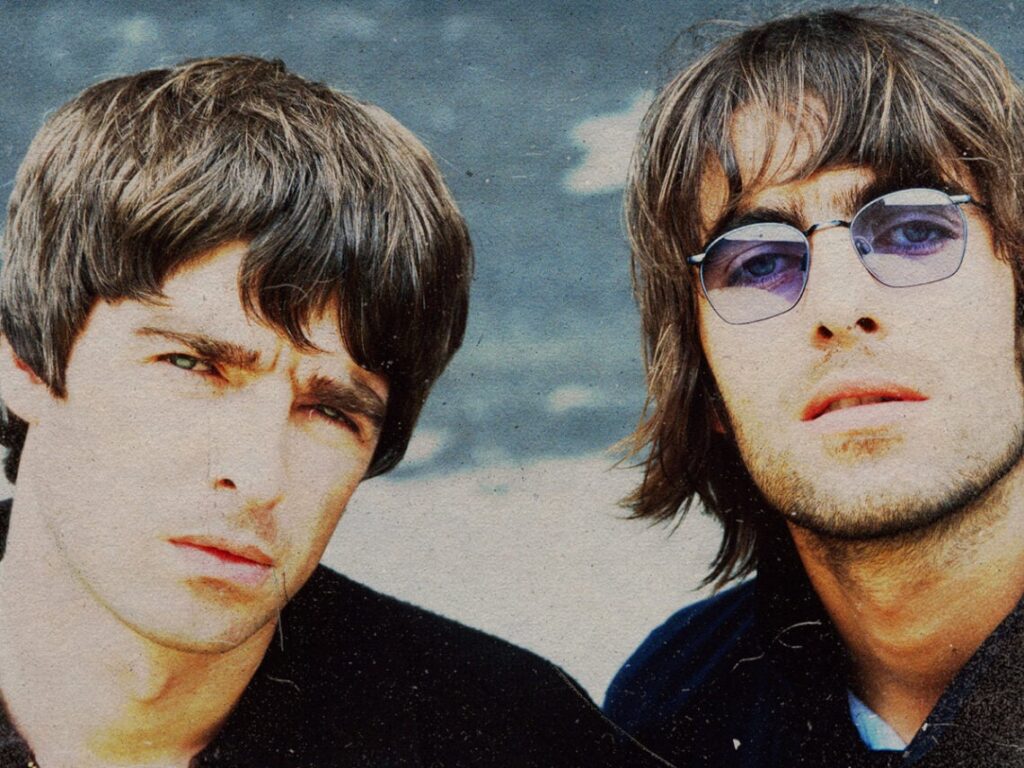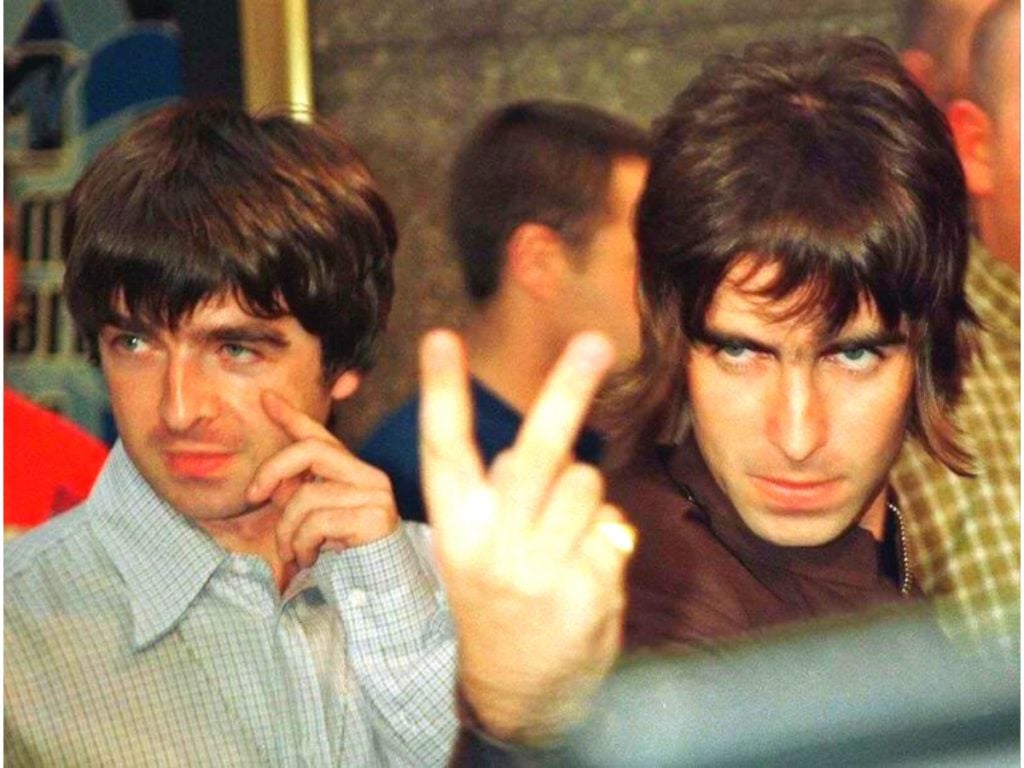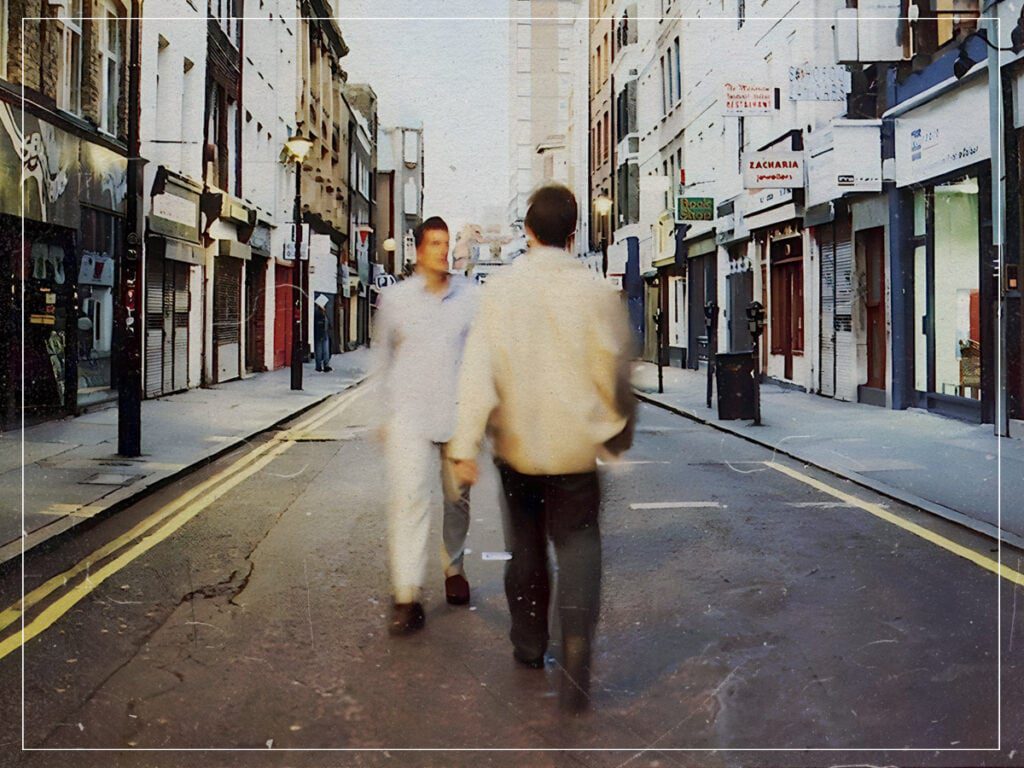Oasis reunion 2025: The double-edged sword of nostalgia
 Posted On
Posted On
(Credits: Far Out / Jill Furmanovsky)
As I write this, ‘Roll With It’ plays in the background. Steadily ratting through the tracklist of (What’s The Story) Morning Glory? it’s hard not to have a smile permeate as an Oasis reunion begins to look more likely than it has done for the past 15 years. Ten nights at Wembley? Tickets for all of them, please. Pint in hand, arms around best friends, strangers with dodgy haircuts, all of us screaming the lyrics to tracks that shaped adolescence for so many across the country. Can you imagine?
On August 22nd, 2009, Oasis played their final gig. Their headline slot at V Festival marked the end of an era, and ever since they departed that stage, fans have desperately speculated about whether or not they will ever reunite. These conversations have dominated every aspect of Liam and Noel Gallagher’s respective solo careers. Despite the majority of albums both have released been received rather well, press runs, TV junkets, the lot all teeter on ambiguous questions of reconciliation, and crowds across the country listen to the new music politely but wait in anticipation for the nostalgia-driven hits.
There’s no question the world wants an Oasis reunion. Those songs are buried in the foundation of this country’s music industry. You won’t find a pub in the north or the south that isn’t lit up with the sound of ‘Don’t Look Back in Anger’, which, as it happens, has just started playing on this tracklist and caused my creeping smile to grow ever so slightly wider.
Why is now the time to be excited about an Oasis reunion? Industry insiders have been adamant that the band are gearing up to get back together in 2025. The rumours claim that the band would look to play multiple shows in Manchester’s Heaton Park and a record-breaking ten-night stint at Wembley.
Liam Gallagher continues to breathe life into this speculation. He replied to an article by The Times today, responding to their rumours about a reunion, saying, “See you down the front you big fanny,” in his typical sense of humour. He recently tweeted again, with the cryptic yet intent post, “I never liked that word FORMER.”

On top of that, the relationship between Liam and Noel doesn’t seem as intense as it was previously, as the two have traded scathing insults for genuine compliments. In a recent video for the 30th anniversary of the band’s debut, Definitely Maybe, Noel said, “When I would sing a song, it would sound good. When he sung it, it sounded great.” He continued, “I can’t sing ‘Cigarettes & Alcohol’, ‘Rock n Roll Star’ and all that. I don’t have the same attitude as him. My voice is half a Guinness on a Tuesday—it’s all right. Liam’s is ten shots of tequila on a Friday.”
While the initial thrill of a potential reunion settles and we bring ourselves back down to Earth, we need to take a moment to look at the bigger picture. Sure, those nights at Wembley would be magic, but what does it say about the modern music industry? The way things work, are we ever going to have a band that can climb through the ranks in the same way Oasis did all those years ago? And how much can we continue to rely on nostalgia in music?
Where’s the new Oasis?
When Noel Gallagher appeared on Jonathan Ross a few years back, he was asked the predictable question that can always be expected whenever either of the brothers makes a TV appearance. “I find it a bit sad that there’s a whole generation of kids, working-class kids, who have got nothing of their own to buy into,” he said when addressing the idea of a reunion, “And they’re projecting all that on to a couple of 50-year-old fellas.”
With the steady nods of the other celebrities plugging whatever sitcom, book, or tour they were on there to promote on the talk show, Noel asked, “Where’s the new Oasis? Where’s that? Where are those guys?”
Noel raises a very good point. We live in an age where it has never been easier to learn to play instruments, make music, record it, and publish it. The tools are there for musical geniuses to be born and global phenomena to rise to the top as the Gallagher brothers did, so why don’t they? Well, it’s not through lack of trying.
Visit one of your local music venues tonight and look at the lineups hitting the likes of Adelphi, Leadmill, and 100 Club in the next few months. You will see that the country isn’t short of new and exciting bands. The lack of a new Oasis isn’t the result of the modern music industry lacking artists; it’s the result of artists lacking support from the modern music industry.
The price of touring is too much for artists these days; the amount that comes with taking a show on the road and trying to follow in the footsteps of musical icons like Oasis is why so many bands can’t commit to music in the same way they used to be able to. The revenue isn’t the same; the cost of living gets in the way of expenses while on the road, and for many people, it simply isn’t fathomable. There is a reason we are seeing a vast class divide in the music industry. The idea of working-class artists piercing the veil is becoming more and more alien.
Despite her massive success with her most recent album, Desire, I Want to Turn Into You, Caroline Polachek took her show to the masses at a loss. “Full disclosure: I’m taking my European tour at a loss,” she said, “But it’s worth it for me. I’ve always leaned to the slightly riskier side of reinvestment back into the project than maybe would be wise.”

Hard Life (formally Easy Life), a band signed to Island Records, had to cancel their North American tour because of the massive cost incursions they would face. “We’re very sorry to say that we’ve had to make the tough decision to cancel our upcoming North American tour,” they wrote, “We’ve tried hard to make it work, slashing budgets and trying to justify some insane costs, but we’re just not able to get the funds to bring the Easy crew over this spring.”
The announcement of an Oasis reunion would bring joy across the country, but it would also shine a light on the very harsh reality that the way things stand in the music industry, we are unlikely to see a band of their stature again. More support needs to be provided to smaller bands by both the industry and also by us as fans. This means the purchase of physical media and merch in a bid to allow those we would like to see dedicate all of their time to music, do so.
Innovation is key to progressing music. As Noel stated himself, the industry cannot be treated as consumer-based; we need to make room for and support original ideas. If we didn’t, many legends wouldn’t have reached the heights they did.
“The consumer didn’t fucking want Jimi Hendrix, but they got him, and it changed the world,” he once said, “And the consumer didn’t want Sgt Pepper’s, but they got it. They didn’t want the Sex Pistols, but they got it. Fuck the customer. The customer doesn’t know what he wants, you fucking give it to him, and he likes it.”
The joy of nostalgia or stuck in the past?
‘She’s Electric’ plays now. I’m rattling through this tracklist while I write, and the constant idea of seeing these songs live, a full band playing them, is monumental. I’m taken back to a smoking area, Lamp, Hull. I’ll have been 17 or 18, trying not to let on that I was drunk after only a few pints and desperately keeping cigarette smoke in my mouth rather than coughing it up. This kind of indie rock music was prevalent back then, and the fact that I’ve gone from my living room in Sheffield back to that smoking area with a brief track highlights the transportive power of music. Like many people, I bask in that nostalgia, but it’s also a double-edged sword.
Record labels and events tend to rely more and more on nostalgia to sell tickets, especially in the world of indie music. We have excellent, modern guitar bands out there who are ready to take to the big stage and show what they can offer, but that big stage is reserved for the likes of Jamie T, The Kooks, and The Streets.
Granted, an Oasis reunion is slightly bigger than The Streets headlining Truck Festival, but the principle remains the same. While nostalgia continues to cough up money, the music industry will persistently avoid taking chances on smaller bands.
In the same interview where Noel Gallagher talks about not letting the music industry be consumer-led, he says, “Now there’s an attitude in the music business where it’s like, well let’s keep the consumer happy because that’s what makes the music business go round.” While reunion gigs continue to break records and sell out arenas, there is no incentive to open the door for the next Jimi Hendrix, Sgt Pepper or Sex Pistols, and as a result, the industry will keep that door tightly shut.
Look at it this way: All the people keen for an Oasis reunion want to hear the hits and are not interested in the band releasing new music. If this is the attitude we adopt moving forward for all artists who sell out stadiums, we will remain in a constant, stagnant loop, trapped by our own love for what came before so much that we’re incapable of seeing what could come next.
The whole thing is a constant horrible contradiction, as while we want to see Oasis get back together, we also want to see the new Oasis rise, and the two things can’t go in tandem. If a reunion does happen, and if these ten nights at Wembley do come to fruition, Oasis will need to use their platform to give smaller bands with big potential the platform they deserve. Let’s use this as an opportunity to lean into nostalgia and push ourselves a bit further away from it.
The future can be bright if we let it be.
[embedded content]
Related Topics


